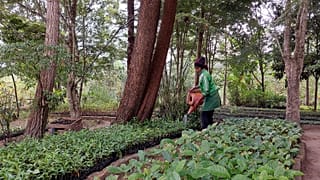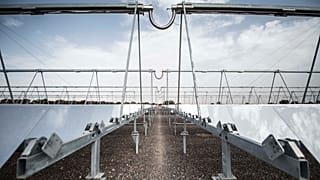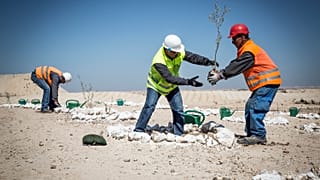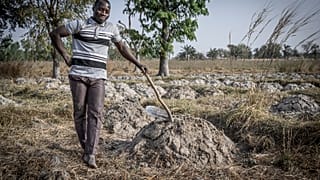Modern-day farming methods seek to maximise yields and minimise waste. This requires, among other things, the most efficient use of fertilisers to add nutrients to the soil. Phosphorus, extracted from phosphate rock, is an indispensable element of these fertilisers.
Around 70 per cent of the world’s phosphate reserves are found in Morocco. These are exclusively managed by the Moroccan OCP Group, which carries the responsibility of caring for these resources for the benefit of current and future generations.
Responsible stewardship is vital to feeding the planet
The US Geological Survey estimates that the mining of current phosphate reserves is sufficient to feed the planet for the next several hundred years. Even so, phosphate rock is a finite resource, and as such requires sustainable management.
In alignment with the UN’s 2030 agenda and Sustainable Development Goals, and given that phosphate management is a core consideration at all levels of OCP’s business, the group has put in place a Circular Economy Program based on four principles: the preservation of phosphate resource; sustainable production; education for intelligent consumption, and the creation of value through streamlined processing and recycling.
As part of this vision, the group has drawn up a resource management strategy that reflects its commitment to innovation, sustainability, and research and development. This strategy covers operational performance, phosphate recovery and recycling, and the efficiency of phosphate fertilisers.
More efficient extraction and maximum performance
A key focus of OCP’s research is on finding new ways to optimise phosphorus extraction.
Several successful R&D initiatives have allowed phosphate beneficiation in a process whereby valuable minerals are separated from unusable minerals. Phosphorus is just one element of the rock matrix extracted from phosphate mines: there are other elements, such as carbonates and silicates, as well as impurities. A washing and flotation process developed by OCP enriches the phosphate after it is extracted. Thanks to the efficiency of this process, the 33 per cent of Moroccan phosphates that were previously considered to have very low, non-viable phosphorus content have become economically viable.
Extracting value from by-products
Several by-products containing phosphorus are produced during the various stages of production. One of OCP's research axes for preserving phosphate is the recycling of generated by-products, such as the reintegration of waste rock containing low concentrations of phosphorus, into the washing-flotation process, enabling the recovery of residual phosphorus and extending the life of the reserves.
Another of OCP’s ongoing projects is the retrieval and use of residual phosphorus from wastewater and organic waste. Working with engineering firm JESA, the group has launched a feasibility study into recovery systems from three wastewater treatment plants in Central Morocco.
Customised and smart fertilisers for better phosphorus efficiency
A further strand of sustainable phosphorus management is the development of more efficient products. The principal methods used to rise to this challenge are, firstly, the evolution of high-performance fertiliser formulas and, secondly, the creation of biostimulants that allow for better absorption of nutrients; generate greater resistance to extreme temperatures, drought and flooding; and which add nutritional value to fruit and vegetable crops.
OCP is investing heavily in developing tailor-made fertilisers that enhance crop yield, limit overuse and preserve existing global mineral reserves. In less than ten years, the group has developed more than 98 custom fertiliser formulas, with ongoing agronomic tests to check performance.
To maximise the effect of these so-called ‘smart fertilisers’, OCP works with farmers to create bespoke systems according to their needs, encouraging and enabling eco-responsible consumption. Fertiliser is customised not only for specific crops, but also according to the nutritional value of the existing soil, ensuring high yields and avoiding phosphorus waste.
OCP’s approach is focused on making the best use of phosphate reserves and helping farmers understand exactly what their soil needs, to deliver exactly the right nutrients and avoid overuse or misapplication.
Over a century of progress and investment in R&D
Founded as a mining company in 1920, the OCP Group moved into phosphate processing in 1965, and is now the world’s leading manufacturer of phosphate fertilisers. With a presence on five continents, it currently employs 18,000 people across the globe.
OCP’s remit extends beyond mining and manufacturing. Since its creation, it has been committed to supporting innovation; developing and deploying partnerships, and R&D solutions aimed at preserving and extending the life of the world’s supply of phosphate.
A member of the International Fertilizer Association, OCP fully adheres to the association’s principles, as well as those of the UN Food and Agriculture Organization’s Fertilizer Code. In 2016, the OCP Group became a founding member of the Sustainable Phosphorus Alliance (SPA), working with other members – such as mining, processing, biosolid and manure companies; wastewater treatment plants; start-ups and academics – to find solutions to current challenges. Last year, it became a member of ESPP, the European Sustainable Phosphorus Platform, and as a result can share knowledge and resources with a growing network of scientists and companies.
We live in a period of almost unprecedented uncertainty. With the war in Ukraine pushing up food costs, and the aftershock of the COVID-19 pandemic, the role of key players such as OCP will be vital to the recovery of global economies and the future of the planet.







